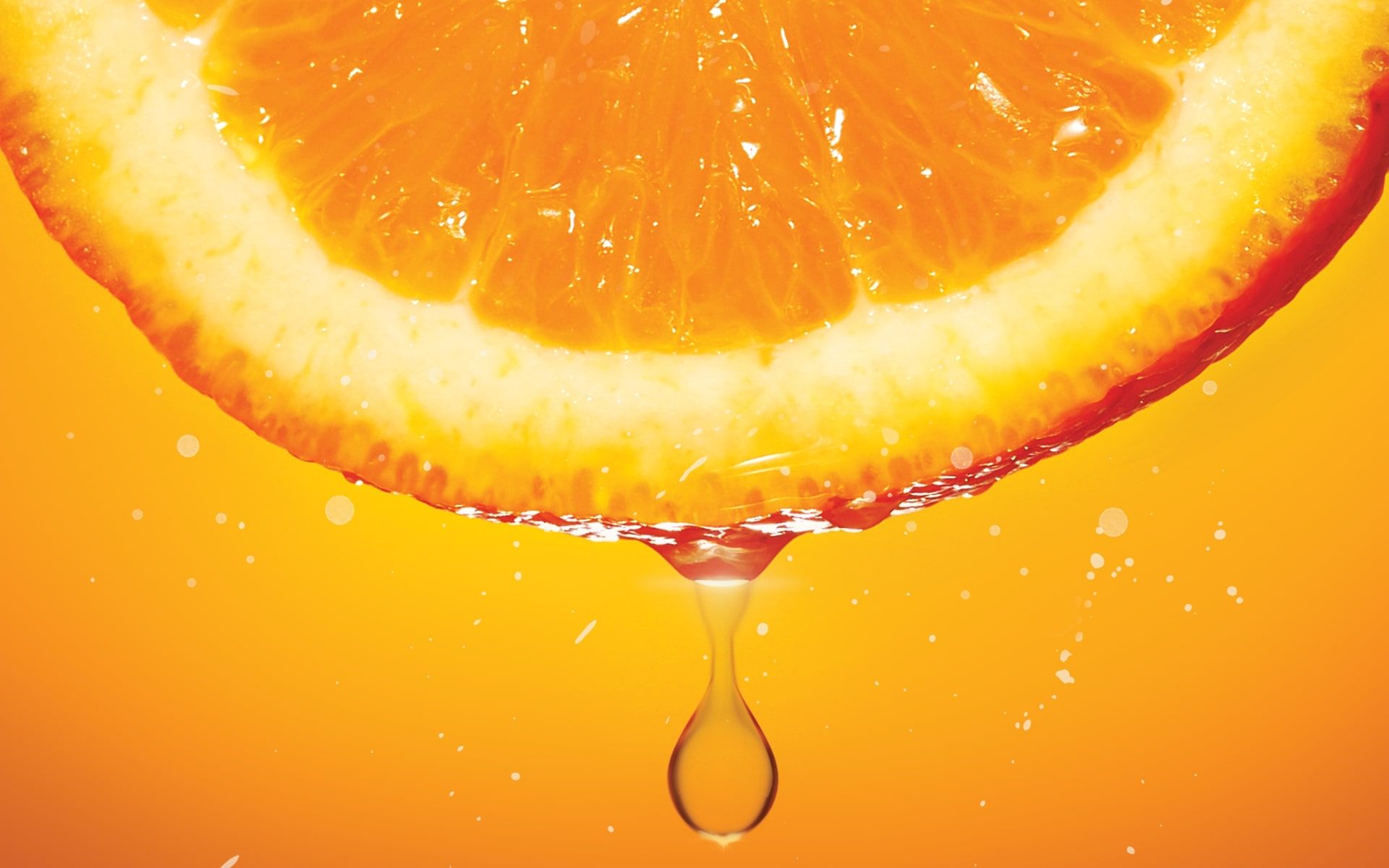
When I visited Thailand years ago, I had the pleasure of tasting about 20 different types of exotic, tropical fruits like pineapple and mango, some of which were first in my life. Each had a unique color, shape, smell, and taste. It occurred to me then that there were plants and fruits in places that we would never visit in our lifetimes and we would never have the chance to taste or smell them, but our tongue was still capable of tasting, smelling, and getting pleasure out of every one of them.
Take the orange for instance. Since it is more easily available and not as exotic as other fruits, we may incline to underestimate it; but in fact it is one of the countless bounties we are blessed with. There are currently over 600 known different types of oranges and they serve as a rich source of vitamin C that helps enhance our body's resistance against illnesses such as the common cold. Therefore, our need for this vitamin increases particularly in the winter. With a beautiful color and smell, oranges contain a plethora of beneficial minerals such as thiamine, and vitamins such as vitamin A [1]. Vitamin C, another vitamin richly found in oranges, is an excellent antioxidant substance that fights carcinogenic free radicals. It is also essential for the protection of skin health. Oranges are also good sources of fibers and potassium that are crucial for heart health. Potassium lowers the risk of high blood pressure. Fibrous content of oranges helps to prevent diabetes development [2].
This fruit is only one of so many blessings that we are unable to count. For us to be able to appreciate these blessings we need to see, taste, feel, smell, and digest them, each of which is another reason to be grateful.
Seeing
We have to see and like the appearance of a food first before deciding to eat it, don't we? We do not want to eat it if we feel disgusted from the way it looks. Our eyes are windows unto life so that we can see and observe the great book of the universe which is filled with miraculous works of art and get to know the divine names and attributes that manifest on them.
“Indeed, the Compassionate Provider, in order to give to them provision in more generous measure has created each of man's subtle capacities – eye and ear, heart, imagination, and intellect – in the form of a key to His treasury of mercy. For example, the eye is a key to the treasury containing such precious jewels as the fairness and beauty to be seen on the face of the universe, and the same holds true of all the others mentioned; they all benefit through faith.” [3]
Everything – from fruits and vegetables to the eggs served by the chicken and the honey put together by bees – is created subtly and packaged in a way to appeal to our eyes in unique and protective enclosures.
Appetite
We have to have appetite so that we develop a desire to eat food. This desire is a capacity encoded into our being so we can enjoy good food and feel aversion for certain things.
“Appetite and desire for sustenance are a sort of innate or instinctive thanks.” [4]
Consuming sustenance with appetite is a way of expressing our thankfulness to the One who provides them for us, for we have appetite for the things we are appreciative of. If we do not have any appetite then we would have no desire to eat even the most delicious food. This is sometimes the case when we are ill and refuse to eat even our most favorite dishes. But think of our commonplace orange again. Like other fruits and vegetables, the orange is created with a shape or allure that will whet our appetite. God has placed sustenance at the very center of His workings in the world of living beings and guides us to this sustenance through the urges of appetite. His servants, on the other hand, are supposed to respond to these blessings with remembrance, reflection, and thankfulness.
Touching
For us to be able to taste and eat an orange, we first have to hold it in our hands. For an action as apparently simple as touching or holding anything, what “we” have to do is only to exhibit willingness to do so. Most of the processes in our bodies occur beyond our control. The joints in our fingers, the size of our hands, and the design of our arms meet our needs in the best way.
It may be an ordinary act for us to move our hands and finger joints with the help of the muscles wrapped around our bonds and triggered into action with electric signals coming through nerve cells. However, when we contemplate on all of these processes we come to the conclusion that they are not casual at all:
“Yes, we see for instance that the members and bodily systems of a fly or human being, and even the cells of the body and red and white corpuscles in the blood, are placed with so sensitive a balance and fine a measure, and they are so fitting and suitable for each other, and their mutual proportion with the other members of the body is so orderly, and they are in such harmony with them, that it is in no way possible that one lacking infinite knowledge could have given them those situations.” [5]
Smelling
The Prophet Muhammad (pbuh) likens believers who read the divine revelation to an orange “whose fragrance is sweet and whose taste is sweet” and those believers who don’t recite are like a date fruit, which tastes sweet, but with no fragrance [6].
Bediuzzaman Said Nursi draws attention to the manner of benefiting from the bounties of God as follows:
“Know, O Friend, that the gifts God has ordained that humanity attain or make use of come with conditions. Some of these conditions are established by God, while others pertain to human beings themselves. For example, light, air, food, and speech are God’s gifts, and how much we benefit from them depends upon our respective organs’ soundness and health. All senses and organs have been created by God Almighty; our role is to keep them sound and healthy.” [7]
The role of our willpower is limited to the functioning of these organs which are required for obtaining and consuming the sustenance needed for our survival.
When we look at an orange closely its shiny skin with thousands of tiny holes catches our attention. After the fruit is picked from a tree it remains fresh for a long time thanks to air coming through the holes in its peel.
It sends out a fragrant smell as it is sliced down. The inner parts of the peel are covered with a white, thick, and soft layer as if it is plastered. There are round, tiny buds with voids between them immediately beneath the outer peel. Like cushions, they add flexibility and strength to the peel. Inside we find segments that look like each other and are placed in an aesthetically pleasing manner. The segments are covered with a strong membrane and protected with white, fibrous walls. The segments contain hundreds of shiny and swollen tiny sacs, each of which are arranged regularly like miniaturized grapes and are also covered with membranes. These juice sacs are protected in this manner because the juice in these sacs contains vitamin C which quickly degrades upon contact with air.
“Let us imagine an army which consists of four hundred thousand nations, and each nation requires different provisions, uses different weapons, wears different uniforms, undergoes different drill, and is discharged from its duties differently. If this army and camp has a miracle-working commander who on his own provides all those different nations with all their different provisions, weapons, uniforms, and equipment without forgetting or confusing any of them, then surely the army and camp point to the commander and make him loved appreciatively.” [8]
Digesting
“Especially the members, faculties, and senses of a single of the innumerable members of those species; they are related to each other with so fine a balance and equilibrium that their balance and mutual proportion point to an All-Wise and Just Maker so clearly as to be self-evident.” [9]
The arrangement of teeth, the shape of the tongue, and the structure of the mouth function in perfect harmony with the alimentary canal, the stomach, and other digestive organs. Teeth are responsible for biting and grinding food, but if the structure and arrangement order of our teeth had differed, i.e., if our grinders had been replaced with incisors, the acts of biting and chewing would be much harder.
If our tongue did not assist us in the acts of turning and grinding food in our mouth, or if it had been larger or smaller, this would have complicated food consumption for us. This also applies to many other wise purposes related to the mobility of our chin or functions of saliva.
Oranges, or whichever blessing you may take as an example, are a sign for us to contemplate and be grateful to the One who generously provides them for us.
"He it is Who sends down water from the sky, and therewith We bring forth vegetation of every kind (from their seeds under the soil), and then from it We bring forth a lively shoot, from which We bring forth close-packed and compounded ears of grain, and from the palm-tree – from the spathe of it – dates thick-clustered hanging (ready to the hand), and gardens of vines, and the olive tree, and the pomegranate: alike (in the fundamentals of life and growth) and diverse (in structure, look, taste, and smell). Look at their fruit, when they begin to fruit and as they ripen. Surely in that there are signs for people who will believe and who will deepen in faith (as they see new signs)" (An-An'am, 6/99).
References
- “What to know about oranges”, www.medicalnewstoday.com/articles/272782.
- Bediuzzaman Said Nursi, Şualar (Rays), Istanbul: Şahdamar Yayınları, 2010, p. 162.
- Bediuzzaman Said Nursi, Mektubat (Letters), Istanbul: Şahdamar Yayınları, 2010, p. 412.
- Bediuzzaman Said Nursi, Şualar (Rays), Istanbul: Şahdamar Yayınları, 2010, p. 635.
- Bukhari, At'imah, 30.
- Bediuzzaman Said Nursi, Mesnevî-i Nȗriye (Epitomes of Light: Mathnawi al-Nuriya), Istanbul: Şahdamar Yayınları, 2010, p. 84.
- Bediuzzaman Said Nursi, Asâ-yı Musa (Staff of Moses), Istanbul: Şahdamar Yayınları, 2010, p. 20.
- Bediuzzaman Said Nursi, Şualar (Flashes), Istanbul: Şahdamar Yayınları, 2010, p. 384.









